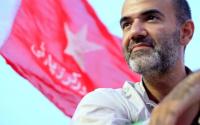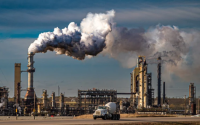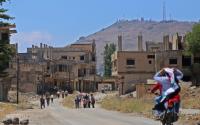18 September 2005Andy Goodall
On a recent visit to Venezuela by VSUK members in August 2005, many local people spoke to me in Spanish, assuming that I could understand them. The lack of comprehension on my part did not matter in the least, since in the eyes of each person there was genuine hope to be seen, since the millions of historically excluded have benefited from the social revolution taking place in the Bolivarian Republic of Venezuela. As a result millions have been liberated by the social missions being provided by the Bolivarian Revolution under President Chavez.
When arriving in the capital city, Caracas, none of the photographs I had seen of the barrios had prepared me for what I was to experience. It was a truly magnificent site from a distance, where millions seem to live in housing spread over the numerous and magnificent mountains. However, on closer examination, the enormous poverty and desperation was obvious when visiting the neighborhoods which had been forgotten for the last 40 years under pseudo-democratic governments of the IV Republic…… until the election of Chavez in December 1998.
However, even in the most desperate of communities, with dilapidated housing, most of which was built by families themselves with no government assistance or town planning. These people who left the countryside in the 1960's to migrate to the capital in the complete absence of any from of agricultural planning at that time, there was no green space, broken roads and paving, and precarious overhanging houses. Nevertheless, hope for the future was obvious.
In the classrooms of Mission Robinson and Ribas where more than 2 million people have been studying numerous literacy, language, primary and secondary school courses, students ranging from teenagers to pensioners talked enthusiastically of their chances to learn and participate in building their own future. Whilst their comments were translated by the unceasing assistance of participants in Venezuela, the hope and confidence that shone from the eyes of the students needed no translation. Every Venezuelan we met on this trip was genuinely grateful for the demonstration of international support from the UK trade union movement and they fully grasped the political and international importance of this solidarity. The Bolivarian revolution is truly a beacon for workers and progressives world-wide.
The recently created octagonal modules which form the base of the Barrio Adentro primary health care mission, run with the support of around 20,000 Cuban doctors, sprouted like mushrooms all around. With each one serving around 250 families, a better ratio than the UK, the opportunity for free and universal health care is available to 14 million so far, out of a population of approximately 25 million. Upon visiting one such health centre I heard the cries of a young child with a cut hand. The deep pain in the voice of a child (as only children do) resounded around the centre whilst he was being treated, was only surpassed by the instant recovery (as only children can) once treated by the caring Cuban doctor. If this had happened anytime before June 2003, when the doctors arrived on mass, the mother would have been left to fend for her son or find resources from a poverty income to visit the dilapidated and highly congested, not so local, hospital.
When visiting the Military Museum in the 23 de Enero neighborhood in Caracas, I met a group of young volunteers registered voluntarily in the Military Reserve, who were amongst the first to respond after the call from Chavez to train to defend the homeland. They talked enthusiastically of their determination to participate in the revolution and further strengthen the links with the community. This is the fundamental bedrock for defending the advances made under the revolution which is based on civic-military unity and cooperation.
In La Victoria, Aragua State, when meeting with members of the Local Communist Party the optimism after the recent success of the local elections was further demonstration of support for the revolution. Our meeting, sitting in the shade in the Plaza Campo Elias, lasted almost three hours and many searching questions were asked - covering the structure of the UK Trade Union movement to the involvement of Britain in Iraq and the Falklands war! The revolutionary consciousness of the local population concerning national and geopolitical topics was well rooted ideologically, in what could have only been gained by study and commitment to the process of change taking place here.
The local party Secretary Carlos Ojeda, who has won a local council election with more votes than any other candidate, has launched a radio program called "Aló Concejal" ("Hello Councillor") from the main square in La Victoria via the local community radio, Radio Juventud 94.7 FM (Youth Radio 94.7 FM). This program is aired live every Wednesday morning with the direct participation of the local communities which can compliment or register complaints, criticize and make suggestions to the Council Chamber members. We spoke on this radio station at the invitation of the Director, Daniel Camino, expressing our solidarity with the Venezuelan workers and gave news about the highly successful distribution of the DVD "The Revolution Will Not Be Televised". We committed ourselves to re-double our solidarity and campaigning within Britain, especially amongst the trade union movement, in support of the progress being made by workers in Venezuela.
Numerous co-operatives have been established to produce products for local consumption by hundreds of thousands of Venezuelans in the framework of endogenous development (development from within) which is a vital sign of significant progress after a 40 year IMF backed reign of economic destruction and indebtedness of the nation.
The last place to be Touched by the Revolution that I experienced was the main maternity hospital in San Martín, Caracas. The Maternidad Concepción Palacios is dilapidated building for a major hospital, and is impatient for the third stage of Barrio Adentro to re-equip all major hospitals in the country from early 2006 onwards. Amongst other things this will hopefully address the chronic shortage of specialist equipment much needed by the highly professionals staff at all levels in the hospital. One doctor was having to perform ultra sound scans of patients requiring brain and abdominal scans with ultra sound equipment designed for completely a different medical application, a vaginal scanner.
Speaking with the domestics and nurses who have created, less than one year ago, the local health branch of SitraSalud, affiliated to the UNT, it was obvious that they have a determination to control their destiny. With a commitment and ability to drive forward and overcome the many obstacles being thrown at them by elements of the IV Republic, the future for the hospitals should soon follow the lead given in the primary health centers, and so complete a nation wide structure to create a national health service - from primary health care in the barrios, to modern, well equipped local popular clinics up to specialized treatment in the hospitals.
VSUK will be speaking at public meetings to talk and share with others the liberating experience of the process unleashed by President Chavez. Increased solidarity is critical in Britain over the coming period and VSUK will play our part.
Andy Goodall, Coordinator VSUK[email protected]www.venezuelasolidarity.org.uk
http://www.zmag.org/content/showarticle.cfm?SectionID=45&ItemID=8760






